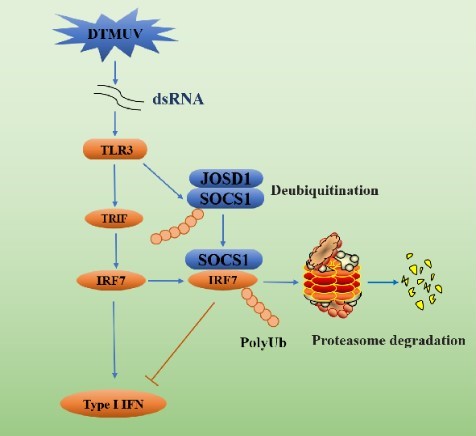author:Shanzhi Huang
In recent years, post-translational modification (PTM) has gradually become a research hotspot in the field of innate immune regulation, and ubiquitination is one of the key PTMs. However, little is known about the regulation of flavivirus-induced type I interferon (IFN) signaling by ubiquitination. Duck Tembusu virus (DTMUV) is a newly discovered flavivirus that seriously harms duck farming. Studies have shown that pre-infection with DTMUV renders the virus incapable of subsequent IFN treatment, suggesting that DTMUV has evolved strategies to defend against host IFN-dependent antiviral responses. Previous studies have found that the suppressor of cytokine signaling 1 (SOCS1) is significantly up-regulated during DTMUV infection, however, the specific up-regulation mechanism of SOCS1 is unclear. In the present study, we found that activation of Toll-like receptor 3 (TLR3) signaling, but not type I IFN stimulation, resulted in the upregulation of SOCS1 during DTMUV infection. Further studies revealed that JOSD1 binds to the SH2 domain of SOCS1 and mediates its de-ubiquitination to stabilize SOCS1 expression. In addition, JOSD1 also inhibited the production of type I IFN through SOCS1. Finally, SOCS1 acts as an E3 ubiquitin ligase that binds to IFN regulatory factor 7 (IRF7) through its SH2 domain, mediates K48-linked ubiquitination and proteasomal degradation of IRF7, and ultimately inhibits IRF7-mediated type I IFN production and promote virus proliferation. Related research was published online in the Journal of virology under the American Society for Microbiology with the title of "Duck Tembusu Virus Inhibits Type I Interferon Production through the JOSD1-SOCS1-IRF7 Negative-Feedback Regulation Pathway", DOI: 10.1128/jvi.00930-22.

DTMUV antagonizes IRF7-mediated type I IFN signaling through the SOCS1-JOSD1-IRF7 signaling axis.

